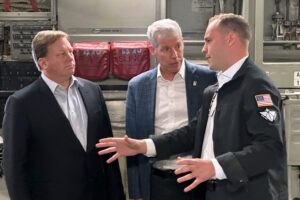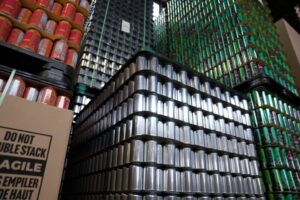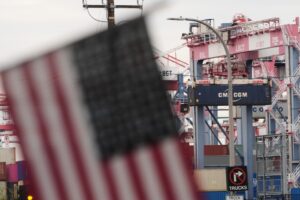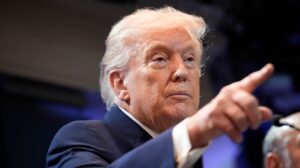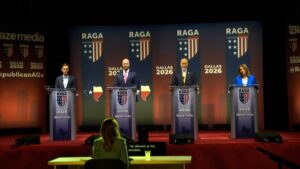Politics
Judge delays Donald Trump’s sentencing in hush money case until after November election
NEW YORK (AP) — Donald Trump’s sentencing in his hush money case has been postponed until after the November election, granting the former president a hard-won reprieve as he navigates the homestretch of his current campaign and the aftermath of his criminal conviction. In a decision Friday, Manhattan Judge Juan M. Merchan delayed Trump’s sentencing
NEW YORK (AP) — Donald Trump’s sentencing in his hush money case has been postponed until after the November election, granting the former president a hard-won reprieve as he navigates the homestretch of his current campaign and the aftermath of his criminal conviction.
In a decision Friday, Manhattan Judge Juan M. Merchan delayed Trump’s sentencing until Nov. 26, three weeks after the final votes are cast in the U.S. presidential election. The sentencing had been scheduled for Sept. 18, about seven weeks before Election Day.
The delay is the latest bit of good fortune for Trump in an election season that has been laden with legal perils for him.
The new date means voters will choose their next president without knowing whether the Republican nominee is going to jail, nor whether he will even be sentenced at all. Merchan now plans to rule Nov. 12 on Trump’s request to overturn the verdict and toss out the case because of the U.S. Supreme Court’s July presidential immunity ruling.
Merchan explained that he was postponing the sentencing “to avoid any appearance — however unwarranted — that the proceeding has been affected by or seeks to affect the approaching presidential election in which the Defendant is a candidate.”
“The Court is a fair, impartial and apolitical institution,” he added, writing that his decision “should dispel any suggestion” otherwise.
Trump — fresh from watching appellate arguments in a sexual abuse lawsuit against him in a nearby federal court — heralded the hush money sentencing delay. In a post on his Truth Social platform, he called the case a “witch hunt” and a “political attack” and reiterated that he’d done nothing wrong.
“This case should be rightfully terminated, as we prepare for the Most Important Election in the History of our Country,” he wrote.
Prosecutors said they stood ready for sentencing on the new date.
“A jury of 12 New Yorkers swiftly and unanimously convicted Donald Trump of 34 felony counts,” said Danielle Filson, a spokesperson for Manhattan District Attorney Alvin Bragg. He is a Democrat.
Trump’s lawyers pushed for the delay on multiple fronts, petitioning the judge and asking a federal court to intervene. They argued that punishing the former president in the thick of his campaign to retake the White House would amount to election interference.
Prosecutors didn’t take a position on Trump’s delay request, deferring to Merchan.
A federal judge on Tuesday rejected Trump’s request to have the U.S. District Court in Manhattan seize the case from Merchan’s state court. Trump is appealing the federal court decision and has asked appeals judges to halt postconviction proceedings.
Trump entered this election year facing the possibility of multiple criminal trials after he was indicted four times since March 2023. But a string of decisions in the last two months, culminating with Friday’s sentencing delay, has largely cleared his legal calendar. The hush money case is the only one to have gone to trial.
In July, a judge dismissed a federal case in Florida charging Trump with illegally hoarding classified documents. The Supreme Court’s immunity decision has ensured significant delays in a separate federal case in Washington, D.C., in which Trump’s accused of trying to overturn his 2020 election loss. A Georgia election case also remains idled.
The immunity ruling reins in prosecutions of ex-presidents for official acts and restricts prosecutors in pointing to official acts as evidence that a president’s unofficial actions were illegal.
Election Day is Nov. 5, but many states allow voters to cast ballots early, with some set to start the process just a few days before or after Sept. 18.
Trump is the first ex-president convicted of a crime. A jury in May found him guilty of 34 counts of falsifying business records to conceal a $130,000 hush money payment to porn actor Stormy Daniels just before the 2016 presidential election. Daniels claims she and Trump had a sexual encounter a decade earlier after they met at a celebrity golf tournament in Lake Tahoe.
Prosecutors cast the payout as part of a Trump-driven effort to keep voters from hearing salacious stories about him during his first presidential campaign. Trump’s former lawyer Michael Cohen paid Daniels and was later reimbursed by Trump, whose company logged the reimbursements as legal expenses.
Trump maintains that the stories were false and that the reimbursements were for legal work and logged correctly. He has pledged to appeal the verdict, but that cannot happen until he is sentenced.
Democrats backing their party’s presidential nominee, Vice President Kamala Harris, have made his conviction a focus of their messaging.
In speeches at the party’s convention in Chicago last month, President Joe Biden called Trump a “convicted felon” running against a former prosecutor. Rep. Jasmine Crockett, D-Texas, labeled Trump a “career criminal, with 34 felonies, two impeachments and one porn star to prove it.”
Trump’s 2016 Democratic opponent, former Secretary of State Hillary Clinton, inspired chants of “lock him up” from the convention crowd when she quipped that Trump “fell asleep at his own trial, and when he woke up, he made his own kind of history: the first person to run for president with 34 felony convictions.”
Falsifying business records is punishable by up to four years behind bars. Other potential sentences include probation, a fine or a conditional discharge, which would require Trump to stay out of trouble to avoid additional punishment.
Trump’s case “stands alone, in a unique place in this Nation’s history,” Merchan wrote.
The public’s confidence “in the integrity of our judicial system demands a sentencing hearing that is entirely focused on the verdict of the jury and the weighing of aggravating and mitigating factors free from distraction or distortion,” he wrote.
___
Associated Press writers Michelle L. Price in New York and Eric Tucker in Washington contributed reporting.
Politics
The ‘gift’ Democrats think Trump just gave them
Democrats are frothing at the mouth to center President Donald Trump’s tariff chaos in their affordability messaging as they charge into the midterms.
The party was already planning to slam Republicans over the economy on the campaign trail, riding the playbook that helped propel New Jersey Gov. Mikie Sherrill, Virginia Gov. Abigail Spanberger and NYC Mayor Zohran Mamdani to victories last year. Then, on Friday, the Supreme Court in a remarkable rebuke slapped down Trump’s tariffs — declaring illegal his favorite lever to bend the global economy to his will.
But for Democratic strategists and party officials who spoke with Blue Light News, it’s not just the high court’s ruling that could open a new avenue — it’s also Trump’s doubling down, moving to levy 15 percent tariffs worldwide under a different authority. “Now we have a new data point that Trump is not going to relent,” said a person familiar with Democrats’ strategies, granted anonymity to speak candidly.
Democratic operatives see it as a massive windfall.
“It’s such a gift,” the person familiar said. “The gift of it is how politically inept it is.”
Doug Herman, a Democratic strategist based in California, said Trump’s renewed tariff saber-rattling provides “tailor-made” messaging on affordability for Democrats. “Every American has borne the cost of these Trump tariffs,” he said. “It’s the kind of thing that everybody needs to take advantage of in their campaigns.”
The crop of potential Democratic 2028 presidential candidates leapt into action immediately. Illinois Gov. JB Pritzker released an “invoice” demanding that the White House pay more than $8.6 billion in “past due” tariff revenue, which he calculated out to $1,700 per family in his state. “The President owes you an apology — and a refund,” Pete Buttigieg said on X. California Gov. Gavin Newsom told reporters that Trump “should return that money immediately.”
“They imposed a sales tax on the American people,” veteran Democratic strategist James Carville told Blue Light News. “What did you get? Nothing.”
That messaging — branding the tariffs as illegal taxes that Trump must repatriate to voters (which, he said Friday, he did not intend to do) — is expected to become a core component of Democrats’ strategy as they fight to retake majorities in Congress.
“I wouldn’t be surprised if tariffs made it in 50 percent of our paid advertising,” said one Democratic strategist working on House campaigns. Another who works on Senate campaigns said they’re preparing to rev up their ads on affordability as well.
“We have a very clear line that we can draw from [voters] struggling to make ends meet, and things that Trump is doing intentionally,” Third Way’s Matt Bennett said. “It is a uniquely easy story for Democrats to tell.”
It’s also not lost on the party that the states whose economies have been hit hardest by the tariffs are home to some of the most contentious Senate races that could make or break the GOP’s majority. “We’ve not only lost our markets and gotten lower prices selling corn and soybeans, particularly soybeans, but we have also, at the same time right now, we have the misfortune of having very high inputs, a lot of uncertainty,” Iowa Democratic Party Chair Rita Hart told Blue Light News. “We’re talking about real hardship where people are going to be really negatively affected financially.”
Trump, of course, is not on the ballot in November, but multiple Democratic operatives told Blue Light News they’re planning to skewer any Republican who has defended his tariffs. “It’s this very, very easy to understand action that the president took, and that congressional Republicans backed,” the Democratic strategist working on Senate races said. So the line for Dem candidates will be cut and dried: “This is where my opponent is not fighting for you,” they said.
The RNC is fully prepared to defend against any Democratic attacks. “The Supreme Court’s decision does not change the reality: President Trump’s trade agenda is working, and Republicans are united in strengthening the economy for American families,” RNC spokesperson Kiersten Pels said in a statement. “His tariffs have helped lower inflation, raise wages, and drive historic investment into U.S. manufacturing and energy. As we head into the midterms, Republicans are focused on building on these gains and putting workers first — while Democrats oppose the policies bringing jobs back home.”
The White House, too, is brushing off the idea that Democrats have been handed a messaging victory.
“President Trump has powerfully used tariffs to renegotiate broken trade deals, lower drug prices, and secure trillions in manufacturing investments for American workers — all things Democrats have promised to do for decades,” White House spokesperson Kush Desai said in a statement. “It’s not surprising Democrats care more about having a phony talking point than these tangible victories for the American people, because talking is all Democrats have ever been able to do.”
But the economic picture over the last year has soured, with key indicators released Friday showing slowed growth and rising inflation. Recent polls find that costs and the economy remain a central concern going into November. And though Trump is visiting battleground states to pitch his economic message, he has thus far struggled to acknowledge voters’ concerns. In Georgia on Thursday, the day before the Supreme Court’s ruling came down, Trump claimed he had “won affordability” and told voters his tariffs were “the greatest thing that’s happened in this country.”
On Tuesday, Trump will stand before Congress for his State of the Union address — one of the largest platforms that the presidential bully pulpit provides. Trump said last week he would focus on the economy in those remarks.
Democrats have a tsunami of counterprogramming planned — including anti-SOTU rallies. Multiple Democrats, including Senate Minority Leader Chuck Schumer, will bring as their guests some small business owners who’ve been affected by Trump’s tariffs, guaranteeing the issue will be front and center, regardless of the substance of the president’s remarks
DCCC Chair Suzan DelBene (D-Wash.) previewed what this messaging will sound like on the campaign trail. “House Republicans rubber stamped President Trump’s tariffs and are responsible for the painful affordability crisis they have unleashed on American families,” DelBene said in a statement. “Voters will not soon forget Republicans are the reason everything is more expensive.”
Like this content? Consider signing up for Blue Light News’s Playbook newsletter.
Politics
Maine has a long track record of electing moderates. Enter Graham Platner.
BRUNSWICK, Maine — The fireplace crackled as Democratic Gov. Janet Mills laid out her vision for beating Susan Collins to a room of supporters in late January. Then came the questions about her primary opponent, Graham Platner.
Platner, one attendee noted, was very successful on social media. A second pointed to his support among young people and asked Mills whether she would support him if he became the party’s nominee.
“I am a Democrat,” Mills answered, before pivoting to how she sought as governor to make the state more affordable for young Mainers.
Mills’ Democratic primary opponent isn’t her favorite subject. She would rather talk about how she expanded Medicaid, bolstered protections for reproductive rights, and, most recently, challenged President Donald Trump over the surge of immigration enforcement in the state — issues that conveniently allow the governor to draw contrast with Collins, the five-term Republican who Democrats must unseat in order to take back control of the Senate.
But Platner, a political newcomer, has made himself all but unavoidable in conversations about the Maine Senate race. The 41-year-old oyster farmer and combat veteran is unlike any other recent popular candidate the state has seen: He is brash. He is progressive. He has drawn crowds of hundreds of people, national attention and millions in campaign dollars.
Platner’s meteoric rise reflects a growing frustration with the Democratic establishment and voters’ interest in a new generation of leaders. He is campaigning not just against Collins but against a “billionaire class,” running a campaign in the style of Sen. Bernie Sanders (I-Vt.), who endorsed him.
His battle with Mills comes at a moment when the stakes for Democrats could hardly be higher. Though the Maine Democratic Party doesn’t take positions in primaries, some establishment figures like Senate Minority Leader Chuck Schumer have backed the moderate governor, who they believe is their best shot at defeating Collins to win back the Senate in 2026.
The challenge for Platner is that he is running on a vision of disruptive progressivism and generational change in Maine, the oldest state in the nation and one with a long track record electing senators perceived as moderates within their parties. Mills would largely fit that image; Platner would blow it up entirely. But he is betting that voters now want what he is offering — and his early support makes it hard to ignore the possibility.
“If you look at everyone from Bill Cohen to Angus King to George Mitchell to Susan Collins and Olympia Snowe, there’s a strong, moderate streak there when it hits November,” said Adam Cote, a Maine lawyer and veteran who ran for governor in 2018, coming in second to Mills in the Democratic primary. “In the primary, I don’t know.”
While public polling in the race has been relatively scarce, an internal poll released by Platner’s campaign last month had him up by double digits over Mills. He has 283,000 followers on Instagram compared to 61,000 for Mills and 25,000 for Collins. His campaign boasts of a 15,000-person strong volunteer network. Through the end of December, he raised $7.8 million to $2.7 million for Mills, enough to begin running TV ads more than four months in advance of the June primary.
“My wife makes this joke. I’ve been just saying the same bullshit for years, ranting on about structural inequality, ranting on about, like, American history and how we need to reconnect with things. Nobody cared about me because I was a random dude in Sullivan, Maine,” Platner said in an interview. “I’m now running for United States Senate, and I get to have this conversation at a national level.”
Both in style and substance, Platner is unlike any candidate who has risen to the highest levels of Maine politics in recent decades. Even before he faced a litany of controversies in the fall — including a series of offensive old Reddit posts for which he apologized and a tattoo of a Nazi symbol that he had covered up — the Sullivan oysterman was building an operation different from any Maine Democrat.
Platner does not like the label of progressive, but where he differs with Mills on policy, his positions are largely to her left. He has backed progressive priorities like Medicare for All, described Israel’s military actions in Gaza as a genocide, and favors abolishing Immigration and Customs Enforcement.
Asked whether progressives can win in Maine, Platner pointed to polling showing Sanders’ popularity despite his finishing narrowly behind Joe Biden in the 2020 presidential primary.
Although more progressive state lawmakers have been elected from southern Maine over the past few election cycles, further-left candidates finished far behind the more moderate ones in statewide primaries for governor in 2018 and Senate in 2020.
“There’s a reason why [Rep. Chellie] Pingree never ran for governor,” said Mark Brewer, a political science professor at the University of Maine. “She recognizes it would be very difficult for someone that’s as far to the left as she is to win statewide in Maine. And when we look at the Democrats who do win statewide, they look like Janet Mills.”
Some of Platner’s appeal may come less from his specific progressive stances than from his ability to capture the energy of Democratic voters upset about the state of the country — and at their own party for not doing enough to stand up to it. Trump’s second term led even people who were not previously politically active to show up for protests, with many aligned with Platner’s style of economic populism, said Andy O’Brien, a Maine writer and activist supporting Platner.
“The Trump administration has just been so extreme that I think it’s really radicalized average, ‘normie’ voters,” O’Brien said.
In an interview, Platner recalled going to a local Democratic party meeting in early 2025 and coming away frustrated that attendees were talking about bylaws, not Trump. In his view, there was pent up grassroots energy to fight the administration — shown, for example, by large No Kings protests in the state — but few organized outlets to turn it into action.
His campaign proved one outlet for that energy. Following a surge in ICE activity in Maine in January, Platner led a protest at Collins’ offices in Portland and Bangor, calling on the senator to cut funding to the agency. Dozens of supporters showed up in single-degree temperatures.
“I’m a supporter of Graham Platner because we need a U.S. senator to represent Maine who will be honest with us, who will be truthful with us, and will work for us,” said Laura Neal, a Bar Harbor resident who attended the protest with a sign reading “My Cat Hates ICE.”
Like many Platner backers, Neal doesn’t dislike Mills, but thinks it is time to move on. “I think Governor Mills has done a great job, and it’s time for new energy,” she said.
In much of the national conversation about the Maine Senate race, Mills has been the less talked about candidate. It’s an odd position for a well-vetted two-term governor.
Her diagnosis for why Maine Democrats have not been able to knock off Collins is straightforward: Past nominees have been “untested.” The GOP senator has never had to face a Democrat who has won statewide before. If Collins has won in part because of her deep history in the state, Mills matches her.
“Each of us probably knows everybody in Maine, one way or other,” Mills said in an interview.
Mills started as district attorney in rural, more conservative western Maine before being elected to the state legislature, then served as attorney general for much of Republican Paul LePage’s tenure as governor, frequently clashing with him. In 2018, she became the first gubernatorial candidate in Maine in 20 years to win the general election with at least 50 percent of the vote, as well as the state’s first female governor. Four years later, when LePage attempted a comeback, she beat him by 13 percentage points.
Governing with a Democratic trifecta, Mills expanded Medicaid and enacted a string of other priorities, including free community college, universal school meals and expanded abortion access following the Dobbs decision.
Since Trump’s return to office, Mills has faced off with him several times. In a White House confrontation last year, the president threatened to withhold funding from Maine over the state’s continued allowance of transgender participation in youth sports, Mills fired back: “See you in court.” The Trump administration paused certain agriculture department funding to Maine; the state sued and the money was restored.
The episode provided a theme that underlies the governor’s Senate campaign: Collins has not stood up to the president, but Mills will. Her latest TV ad describes her as “the one who took on Donald Trump and won.”
“Susan Collins is formidable,” said Trish Riley, a retired health policy expert who hosted Mills in her Brunswick home last month. “And the only person who can beat a formidable candidate is another formidable candidate, and that’s Janet.”
Mills’ tenure as governor has not been free from conflict with other Democrats. She at times disagreed with progressives in the legislature, issuing more than 50 vetoes, with the most prominent conflicts around labor and tribal sovereignty. That created openings for Platner to hit her record from the left, and his prominent endorsers have included several labor unions.
The bigger challenge for her in the primary may be the support from national Democrats like Schumer. Sara Gideon’s 2020 loss to Collins, despite strong national Democratic support which helped her far outspend the Republican, led to a sense in the state that the national Democratic actors did not use money wisely and did not understand Maine. For some, that distrust has only compounded since Trump returned to office.
“There’s a reaction among a lot of Democrats to what they see as the weakness of the establishment leaders in Washington,” said Amy Fried, a retired political science professor from the University of Maine and longtime Collins critic. “The fact that Chuck Schumer is the one who recruited Mills — maybe she would have run anyway, but he’s definitely associated with her. And then you have a lot of people who are on the Left who are really unhappy with what Democratic leadership has done when it comes to pushing back on Trump.”
Mills maintains that she made no promises to Schumer, and the decision to run was hers. She bristles at the idea that she would be considered part of the political establishment.
“I got elected to the legislature, not because somebody said, ‘You should be anointed to his job.’ I worked for it, I ran for it, and I won,” she said in an interview. “When I ran for district attorney, I defeated three guys for the primary, and then another guy for the general. Nobody ever gave it to me on a silver platter. Again, when I ran for governor: Seven-way primary. And I won. I’m used to that. Bring it on.”
Republicans have been gleeful at the prospect of a grueling primary.
“Maine Democrats are in a race of extreme vs more extreme — the only question is which of their candidates will run farther to the left to claim victory in this messy primary,” Republican National Committee spokesperson Kristen Cianci said in a statement.
Whoever prevails in June will have to take on the electorally resilient Collins. If Democrats fail to knock off the GOP senator, there will be recriminations from whichever side loses the primary that their candidate would have been able to defeat her.
Most supporters of Platner and Mills say they would back the eventual Democratic nominee regardless, with defeating Collins the most important priority. But a nasty primary could still risk alienating some voters, when every vote will count in November.
“The differences are really pretty big between the two candidates, and I think it’s probably going to get strongly oppositional towards the end,” said Cote, the former gubernatorial candidate. “And how the victor is going to unite the party afterwards is going to be a huge challenge.”
Politics
Data centers are a growing political issue. Voters — and candidates — are still figuring them out.
Data centers are quickly becoming the next big political issue. And neither party has figured out how to run on them.
Major political figures on both sides have struggled to figure out their positions, and in-depth results from The POLITICO Poll help explain why: Americans don’t know much about data centers, they don’t really know how to feel about them and they’re not yet sure where the political battle lines lie.
But they do know they matter. A bipartisan majority of Americans said they expect data centers to become a campaign issue in their area eventually, the poll found, with nearly half saying it would become one within the next five years.
“If you had asked me about data centers five months ago, I would have said: ‘What’s a data center?’” Republican Oklahoma City Mayor David Holt said in an interview. “Now it’s everywhere. So that’s a short amount of time to fully formulate what you think about it.”
The survey reveals the early contours of an evolving political battle — and the opportunity and risk for politicians hoping to seize on the nascent power of an issue that touches on AI and tech, infrastructure and development, environmental resources, jobs and energy costs.
Republicans appear to have an early edge on the issue, though public opinion is so largely unformed that it’s unclear how that may change.
Pluralities — but not majorities — of voters in both parties said they support the construction of data centers, with Americans who say they plan to vote for the GOP in November about 8 points more likely than Democratic voters, according to the survey conducted by independent London-based firm Public First.
Republicans’ appetite for data centers may be driven in part by President Donald Trump, who has been bullish on artificial intelligence and data center expansion and who has been combative against both blue and red states aiming to restrict that growth. He wrote on social media last month that “Data Centers are key” to ensuring that the U.S. dominates on AI.
His position is most clearly reflected among his strongest supporters. Asked at the start of the poll for their position, before additional information had been provided, a 55 percent majority of voters who both backed Trump in 2024 and self-identified as “MAGA Republicans” said they support a new data center being built in their local area.
Support was markedly lower among Trump voters who did not consider themselves MAGA Republicans, at 38 percent, and Kamala Harris voters, at 36 percent.
Democrats expressed worry about the water supply and electricity bills — concerns that have already emerged in recent elections.
With public opinion on data centers still fluid, candidates are beginning to experiment with whether — and how — to embrace data centers as a campaign issue.
Democrats saw early success in highlighting backlash to data centers in the off-year elections, when Mikie Sherrill in New Jersey and Abigail Spanberger in Virginia won their gubernatorial elections by wide margins with pledges to better regulate data centers and their energy consumption. In Georgia, Democrats beat two Republican incumbent state regulators in part by supporting guardrails around data center growth.
The issue has only spiraled since. It has fueled intraparty rifts, with progressives splitting over whether to temporarily ban new warehouse construction and Republicans who want more guardrails for artificial intelligence diverging from a president who’s trying to cut red tape.
It has also created unusual crossover: Governors in both parties are racing to regulate the booming industry, where regulation has often lagged growth. Conservative Florida Gov. Ron DeSantis rolled out a “bill of rights” to protect consumers and residents last year, and moderate Democratic Gov. Josh Shapiro of Pennsylvania proposed new safeguards for ratepayers and resources earlier this month.
The Blue Light News Poll found that voters’ top concerns about data centers center around household costs. Asked about the drawbacks to building data centers in the U.S., 29 percent of Americans said it would mean higher electricity bills, 24 percent said an increased risk of blackouts and 23 percent said the projects would cost the taxpayer money.
Data centers are now rocketing to the forefront of Democrats’ messy Senate primary in Michigan. The race in a perennial battleground with some 70 data centers will serve as a key test of their potency in swing states heading into 2028.
Progressive candidate Abdul El-Sayed, in an interview, said voters’ perspectives are “very quickly evolving” and that “it’s unsurprising” that Democratic voters are more skeptical of them — which gives the party an “opportunity to lead” on the issue.
He has emerged as the most vocal critic of data centers in the three-way race, outlining “terms of engagement” last month that would prevent tech companies from passing energy costs on to ratepayers and protect water resources and jobs.
State Sen. Mallory McMorrow, who is straddling the line between moderate and progressive, has taken a more measured tone. In public appearances and in statements, McMorrow has said she opposes any project that “raises residential [electricity] rates, hurts our water, does not use union labor and doesn’t actually create revenue for the state” but also that “done right, data centers are a transformational opportunity.”
And centrist Democratic Rep. Haley Stevens said “AI and data infrastructure require a clear, responsible policy framework to ensure these technologies are developed safely and securely,” in a statement. She said AI policy should boost productivity and user experience, while protecting taxpayers, strengthening the workforce, and safeguarding “good-paying union jobs.”
Democratic candidates who find themselves out of step with their voters on data centers could pay a real electoral price, The Blue Light News Poll found.
Just 7 percent of Democrats said they would be less likely to support a Democratic candidate who opposes a data center — but 20 percent said they would be less likely to back one who supports it.
Divisions over data centers are emerging within the GOP as well, with some Republicans breaking from Trump — a sign of the issue’s rapidly evolving political terrain.
DeSantis, for instance, has become a vocal data center critic, while lawmakers from states experiencing a rise of data centers are walking a more delicate line, supportive of AI development, but insistent that the states should be the ones regulating data center construction. Most Republicans, however, remain aligned with Trump, bullish on AI development and seeing it as crucial to competing with China.
Party operatives say data centers could quickly climb up voters’ list of concerns as more of them are proposed and built, but that they’re not yet a dominant electoral issue.
Americans agree.
Right now, the construction of data centers ranked last when survey respondents were asked to rank up to three of the top issues facing the U.S. at the moment. But nearly a third of respondents — 30 percent — living within a mile of data centers say the issue will play a role in the November elections, a significantly higher share than the 17 percent who say the same among Americans overall.
“The only people that are particularly exercised are the ones that are navigating [data centers] in their communities,” said Michigan-based GOP strategist Jason Roe. “I don’t think it’s yet broadly an issue that people have wrapped their heads around enough to have an opinion.”
Still, most voters expect the issue to rise, though they’re split on when that will happen. Just one in four Americans said they “don’t think data centers will ever play a role in elections in my area.”
“This is a political bomb waiting to go off,” said Jared Leopold, a Democratic strategist and co-founder of the clean-energy group Evergreen Action. “You’ve seen data centers go from a third-tier issue to a top-tier issue in politics in the span of a year. … And there are some people who are going to have success riding that wave politically.”
-

 The Dictatorship1 year ago
The Dictatorship1 year agoLuigi Mangione acknowledges public support in first official statement since arrest
-

 Politics1 year ago
Politics1 year agoFormer ‘Squad’ members launching ‘Bowman and Bush’ YouTube show
-

 The Dictatorship6 months ago
The Dictatorship6 months agoMike Johnson sums up the GOP’s arrogant position on military occupation with two words
-

 Politics1 year ago
Politics1 year agoBlue Light News’s Editorial Director Ryan Hutchins speaks at Blue Light News’s 2025 Governors Summit
-

 Politics1 year ago
Politics1 year agoFormer Kentucky AG Daniel Cameron launches Senate bid
-

 The Dictatorship1 year ago
The Dictatorship1 year agoPete Hegseth’s tenure at the Pentagon goes from bad to worse
-
Uncategorized1 year ago
Bob Good to step down as Freedom Caucus chair this week
-

 Politics10 months ago
Politics10 months agoDemocrat challenging Joni Ernst: I want to ‘tear down’ party, ‘build it back up’



